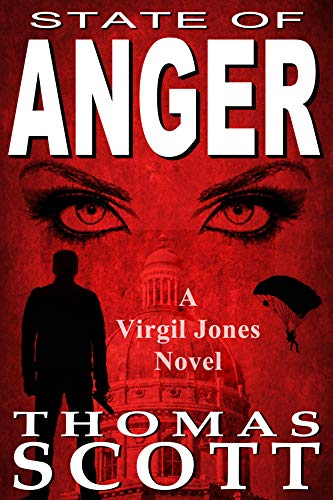Interview with Thomas Scott
Author of State of Anger
Thomas is a full-time writer and former airline pilot and Director of Flight Operations for a private corporation.
He is best known for the Virgil Jones series: State of Anger, State of Betrayal, State of Control, State of Deception, State of Exile and the latest, State of Freedom
Thomas lives in northern Indiana with his lovely wife, Debra, his children, and his trusty sidekicks and writing buddies, Lucy, the cat, and Buster the dog.
Buy this book
Thomas, could you take us through your writing process/routine? Many of our readers are also writers themselves, and it's always interesting to see how writers manage their time, the sequence they go through in creating a new work of fiction -- the nuts and bolts of writing a suspense thriller
- I'd be happy to, but first, let me simply say thank you for including me and my work as a part of your interviews. It's an honor.
My writing process or routine is, I imagine, like most other writers. We stare at a blank screen in shock and horror for hours on end, then give up and try again the next time we sit down at the computer. I'm being sort of facetious there, but I do believe there's some truth to that statement. The goal is to write every day, though that rarely happens. We all have busy lives, errands to run, lawns to mow, etc. I do find though, that if I write first thing in the morning, I get much more accomplished. My mind is clear and open to the possibility and sense of story. I don't use outlines, though I do keep a notebook handy for ideas that'll pop into my head. I usually manage to write at least five days a week and produce somewhere in the neighborhood of 2,000 words a day...then the next day I'll sit down and whittle that back, deleting the stuff that doesn't work...stuff that doesn't have any flow or direction, then do it all again the next day. My wife jokes that for every novel I write, I've actually written two or three, and she's probably right about that. But my goal is to give readers a story they can really lose themselves in, one that takes the worries of their world away for a while.
I treat writing like a job. I dress for work, I show up on time, and like I said, I do at least five days a week. When you write for a living, I think you have to give the craft the respect it deserves. Plus, it helps keep the lights on.
Some online reviewers have been offended by profanity in your novels. What's your philosophy when it comes to writing dialogue? Do you see a difference between the USA and the UK, for example, in this regard?
- I've got a tagline on my website (thomasscottbooks.com) that says: Truth Lies in Fiction. In other words, I believe you can put anything you want in a piece of fiction, as long as it's the truth. One of the truths we all deal with or experience almost on a daily basis is profanity. I write suspense thrillers, or mystery thrillers (however you'd like to categorize them) focusing primarily on crime. And where there's crime, there's cops. Cops and criminals use profanity, so yes, it does show up in my dialogue, but (and I do believe this is an important distinction) only when and where it is appropriate and necessary to make the point. I don't use it thoughtlessly or for shock value. I also think it's important to note that very little, if any, of my dialogue is vulgar. There's quite a difference between profanity and vulgarity. I'll use the former when the character's voice calls for it, but I do my level best to stay away from the latter.
To be honest, I'm not sure if I see a difference between the USA and the UK. I know I've managed to offend both, so it's hard to say. I have noticed that the people who are most upset are often the ones who are really wrapped up in the story. I think that means that the characters are real to them, and suddenly they're a little shocked when they encounter dialogue with profanity. My books are not Christian fiction, nor are they G-rated. They are more along the lines of an R-rated movie. That being said, when was the last time you saw an R-rated movie or HBO series that didn't have one or more characters using profanity? I can't think of any.
You like to blend together a couple of sub-plots to make a more complex whole. How do you keep track of all the moving parts?
- Great question. Interestingly, the characters themselves help me keep track as I'm writing. All of my novels are heavily character-driven. Plot is secondary, and something I rarely give much thought to. The plot itself (to me) is nothing more than the vehicle the characters use to move the individual novels (and the overarching storyline of the series) along its own path. Also, I don't write in a linear fashion. I'll often write something about a character or a particular scene, then set it aside, knowing it will come up later (or be useful earlier) in the story. It's a little like writing out the pieces of a puzzle, then when all the pieces are complete the story comes together. Also, as I get to know my characters more and more...their individual strengths and weaknesses, they seem ready and willing to point me in the direction the story needs to go. Usually if I'm struggling with a particular scene or even a paragraph, I discover that I'm not listening to my characters. When I start to listen, the struggle goes away.
In a nutshell: what's the storyline?
- Family...period. The good, the bad, the secrets, the compromises, the truths we sometimes don't want to tell others, let alone ourselves. Of course it's all wrapped up in a package where an airplane hits a hotel, two snipers terrorize the city of Indianapolis, and the protagonist discovers certain truths that not only change his life forever, but put a number of events into motion that lead to an entire series.
Where does Virgil come from? Does he reflect some aspect of you, or people you grew up with? He's an uncompromising individual...
- Another great question. I want to make it perfectly clear that I am not Virgil. That said, Virgil and I have many of the same qualities...and quirks. But he's also an amalgamation of sorts. His strengths and weaknesses are a combination of any number of people I've admired in my life. The uncompromising part, however...yeah, that's probably me, for better or worse.
Why Indiana?
- Two reasons: One, it's where I grew up, and still live. I love Indiana. I always have and I always will. It's a state rich with history and character and really great people. Of course there's a few bad apples in the barrel too, and that keeps things interesting and makes my job easier. Burke does a fantastic job with Louisiana, Sandford has done the same with Minnesota, White absolutely nails Colorado, Connelly does a fine job with L.A., and Iles keeps Mississippi on the map. Second, Indiana is right in the heartland of the midwest and there just aren't any mystery/thriller writers who actually write about Indiana. Chicago, New York, L.A., Boston, Seattle...plenty of writers have those areas covered. I like to go where no one else is operating.
If you had to pick an actor to play Virgil, who would it be?
- That is a very tough question. I haven't seen that many where I've thought, yeah, he could do it. Off the top of my head though, I'd have to say Charlie Hunnam, who was the star of Sons of Anarchy. Oddly, I've a handful of wonderful actors picked out who could play Murton, Delroy, Mason, Sandy, and Becky.
State of Anger is the first in a - now - well-established series. How does it feel, growing your characters over such a long timeline? How has Virgil's character evolved over the series? And when will you give Virgil an easy day at the office?
- I think that's the fun part...the growth of the characters, and I get to watch it happen. It's a natural evolutionary process, one in which I have little control. Virgil's growth (and I think this is interesting) has probably been the slowest of the bunch. Maybe because he's stubborn, or likes to be in control. Speaking of control, at the end of State of Control, in the acknowledgments section I say (in part) the following: I've discovered that writing—much like the most important and fundamental parts of my life—is largely out of my control. If I try to force it, I find myself floundering around making myself (and pretty much everyone around me) miserable.
But I've also discovered if I surrender and let go...lose control, in other words, something magical happens every single time.
So I think Virgil is beginning to learn that lesson. He has some wonderful teachers. All he has to do is listen.
What are you working on at the moment? What's next?
- The current project is book #7 in the Virgil Jones series, State of Genesis, and it should be ready by this fall (2019)
Where do you see the series ending?
- Well, there are 26 letters in the alphabet, so...
Synopsis
Detective Virgil Jones, leader of the Major Crimes Unit tackles the hard cases. 'The good stuff' his boss likes to call it. Except there's nothing good about his latest case. Nothing at all. A team of serial snipers are on the loose...their civilian victims chosen at random. Or are they?
With no witnesses and very little evidence, the Major Crimes Unit is ordered to find and stop the killers by any means necessary. Except when Virgil's long-lost adopted brother, a convicted felon named Murton Wheeler comes back to town, in trouble and on the run, Virgil knows it's more than just coincidence. He can't prove it...in fact, he's not even sure he wants to.
As the bodies continue to mount, Virgil finds himself running out of options, knowing he has to choose where his true loyalties lie...with the people he's sworn to protect, or to the brother that left him behind when he needed him the most.
But in the end Virgil discovers he never really had a choice, because the final bullet reveals a truth that will change his life forever.
"This is Crime fiction at its finest…a Thriller filled with mystery, suspense, humor and a touch of romance as well!"
Pick up your copy of the Mystery, Thriller & Suspense book that turned Thomas Scott into a household name. If you like John Sandford, James Lee Burke, Scott Pratt, Robert Crais, Michael Connelly or C.J. Box, you’ll love Thomas Scott!

